|
|
|
Sort Order |
|
|
|
Items / Page
|
|
|
|
|
|
|
| Srl | Item |
| 1 |
ID:
128739


|
|
|
|
|
| Publication |
2014.
|
| Summary/Abstract |
In this article I view Asian alliances as a product of universal security needs and culturally constructed variables. While the alliance remains one of the fundamentals of contemporary international politics, I attempt to show through comparative analysis of the Sino-Soviet alliance and the Japan-US security alliance how subtle differences of national developmental experience can significantly affect political outcomes in East Asia.
|
|
|
|
|
|
|
|
|
|
|
|
|
|
|
|
| 2 |
ID:
091427
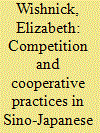

|
|
|
|
|
| Publication |
2009.
|
| Summary/Abstract |
This article reexamines the conventional wisdom that characterizes Sino-Japanese energy relations as predominantly competitive, but views Sino-Japanese environmental relations as essentially cooperative. Using sociological theories of risk, it is argued that Sino-Japanese cooperation is more likely in both the energy and environmental areas when common risks are perceived and relative gains are minimized. Despite their many conflicting strategic, political, and economic interests, as energy importers who are vulnerable to supply interruptions in the Middle East and competitors for global energy supplies, China and Japan share common risks to their energy security. Consequently, there actually may be increasing opportunities for China and Japan to address their common concerns through bilateral and multilateral cooperative practices, such as common positions on pricing or energy conservation initiatives. Although one would expect China and Japan to highlight their mutual interests in tackling environmental problems such as air pollution, in fact relative gains often impede cooperation. Japan increasingly views China as an economic competitor and is reducing environmental aid, while China continues to set a priority on economic growth, which sets limits on the use of costlier Japanese green technologies. By examining a selection of scholarly articles, reports and newspaper articles by Chinese and Japanese analysts, as well as material from interviews in Beijing and Tokyo in May-June 2007, the paper shows how environmental and energy issues in Sino-Japanese relations may be framed as threats, requiring counter-measures, or common risks, which can be addressed through cooperative practices. Lastly, the paper discusses the possibility of the development of an energy security 'risk community' as cooperative practices develop between China and Japan. Nonetheless, conflicting political interests, strategies, and self-images, accentuating relative gains, may provide obstacles to their cooperation in both energy security and environmental protection.
|
|
|
|
|
|
|
|
|
|
|
|
|
|
|
|
| 3 |
ID:
128395


|
|
|
|
|
| Publication |
2014.
|
| Summary/Abstract |
Most everyone has heard of the South China Sea debate, the enduring argument between China and most every other state that has a coastline on that waterway. From Indonesia to the Philippines, every state is angry with China over its claim that it maintains full ownership rights to nearly all of the sea's islands and resources.
|
|
|
|
|
|
|
|
|
|
|
|
|
|
|
|
| 4 |
ID:
128271
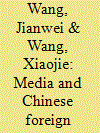

|
|
|
|
|
| Publication |
2014.
|
| Summary/Abstract |
In recent years, the relationship between the media and the foreign policy-making process in China has become more interactive and even a typical symbiosis. This paper attempts to conduct preliminary research on this very dynamic and changing relationship in the context of Sino-Japan relations. It argues that the Chinese media helps shape the agenda for foreign policy makers, narrow down the set of policy options, change the pace of policy making and implementation, and influence the direction of the final decision. Yet more often than not, the government still controls and regulates the reporting by the media on foreign policy issues. Once the media is perceived as going too far, the government never hesitates to rein it in through various internal and external mechanisms.
|
|
|
|
|
|
|
|
|
|
|
|
|
|
|
|
| 5 |
ID:
125623
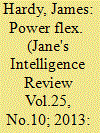

|
|
|
|
|
| Publication |
2013.
|
| Summary/Abstract |
China's military expansion is prompting a major reassessment of Japan's security strategy by the government. James Hardy examines the changes to Japanese defence policy and the country's attempt to assert its role on the international stage.
|
|
|
|
|
|
|
|
|
|
|
|
|
|
|
|
| 6 |
ID:
131385
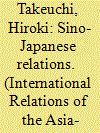

|
|
|
|
|
| Publication |
2014.
|
| Summary/Abstract |
China and Japan have been deepening economic interdependence over the last two decades, while China has recently shown territorial ambitions and initiated disputes with Japan. This runs contrary to the commercial liberal literature that argues that trade promotes peace. On the other hand, the realist theory also does not fully explain Sino-Japanese relations because Sino-Japanese relations are not always in conflict. The rise of China and the relative decline of Japan might explain increasing tensions in the rivalry relationship, but what drives Chinese leaders to initiate disputes? I address the importance of domestic politics to examine Sino-Japanese disputes. I argue that the recent deterioration of the bilateral relationship could be explained by the power struggle in the Chinese leadership. To support the logic of this argument, I use a game-theoretic model, which accounts for how the type of Chinese leadership influences foreign policy outcomes in Sino-Japanese relations.
|
|
|
|
|
|
|
|
|
|
|
|
|
|
|
|
| 7 |
ID:
171004
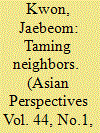

|
|
|
|
|
| Summary/Abstract |
Since 2010 China, with its increasing economic power and influence, has adopted significantly aggressive policies toward its neighboring countries that adopt policies that could infringe upon China's national interests. This study aims primarily to answer the following question: What have been the impacts on itself of China's use of economic retaliation? In other words, what effects have China's economic sanctions had on its overall ability to influence other countries? After examining three remarkable cases of China's imposition of economic pressures on its neighbors since 2010—Japan in 2010 and 2012 and South Korea since 2016—the author finds that China's use of economic coercion can have significantly negative impacts on China itself and can also be very costly in political and strategic terms.
|
|
|
|
|
|
|
|
|
|
|
|
|
|
|
|
| 8 |
ID:
128331
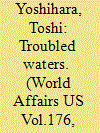

|
|
|
|
|
| Publication |
2014.
|
| Summary/Abstract |
Japan and China have been staring each other down in the East China Sea for well over a year now. Since Tokyo nationalized the Senkaku/Diaoyu Islands in September 2012, Chinese "maritime law enforcement flotillas" have been making the rounds in the disputed waters near the islands. China insists that the regular patrols are routine and normal. Japanese Coast Guard vessels have been working overtime to monitor and trail every Chinese intrusion, lest Tokyo concede Beijing's jurisdictional claims. Before this so-far low-decibel crisis began, it seemed unlikely that China would be willing to contest Tokyo's sovereignty over the uninhabited islands-islets is actually a better term to describe them-and administrative control over surrounding waters for as long as it has. And even fewer thought that Japan would be straining for an appropriate response. It is a testament to changing assumptions about China's growing ambitions that this protracted test of wills has gone largely unreported in the Western press. This cat-and-mouse game has seemingly become the new normal in maritime Asia.
|
|
|
|
|
|
|
|
|
|
|
|
|
|
|
|
|
|
|
|
|